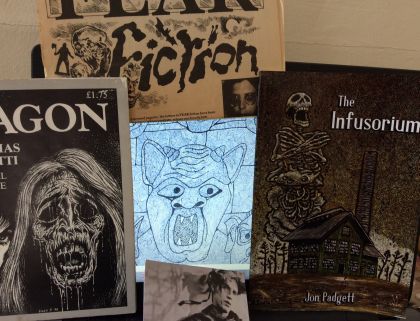The Infusorium – Jon Padgett

THE INFUSORIUM by Jon Padgett
Dunhams Manor Press 2015
I have just received this book as purchased from the publisher.
My previous review of a Jon Padgett work HERE.
I intend to review this work in the thought stream found below or by clicking the post’s title above.

“Why did I bother connecting the dots between those missing persons and the skeleton letters?”
A satisfyingly prose-clotted Dunnstown urban noir feel, where the feisty and eye-catching and asthmatic woman detective narrator crudely (yet with a good texture) soliloquises us as if we readers are really here or there, paying attention to her, our eyes agog, lungs primed, to hear all what she tells us about her police career and her partnership with Detective Guidry, and the librarian who, with her researching at his library the ‘appendages’ skeleton case, comes up on her gaydar, I guess — and, meanwhile, the skeletons case itself (weird Tree of Life and its bony roots?) and the city blending into parkland without any markers indicating where the cusp between them becomes one or the other, and the still smoky, crap-foggy residues of a derelict Paper Mill in Treasure Forest, are somehow interrelated, all striking me as pretty suffocating but also enchanting (paradoxically). Enthralling. Must eke it out and savour its soot slowly. Another 20 pages yet to read and report on here. No spoilers, though.
The previous fiction by this author I’ve read and enjoyed is about ventriloquism. No ventriloquism here – so far. But vents? Maybe. Just maybe.
“Once at a railway crossing, I was nearly hit by a muted locomotive engine puffing down the tracks, winding its way through the fog-diseased park neighborhoods — the train appearing and disappearing like a ghost of itself.”
My first published story was entitled ‘Padgett Weggs’ in 1986 when I was 38. Just thought I’d mention that gratuitously.
I am increasingly impressed by the cut of this text’s jib. The narrator and Guidry visiting the Paper Mill, where there floats either flakes of asbestos or Sea Monkeys (please see their wonderful dialogue about the latter – not to be missed) both of which phenomena I sense to be insidiously parthenogenetic. (Parthenogenesis – along with the Large Hadron Collider at CERN Zoo – was in the UK news today, as scientists have discovered endangered species somewhere fighting against extinction with this method). The narrator’s later visit to the librarian (the reading about which I am at present tantalisingly ‘in media res’) is mordantly funny and the characterisation is believably developing in various directions of scatological and eschatological personal eccentricity, as is the Dunnstown ambiance and the mystery of the skeleton creatures (I can’t do justice here to what they are like – you need to read the book for that.)
Preternaturally, I still seem to have the knack of choosing books to read that have that same preternatural power, judging by the evidence of this book – so far.
This is Ligottian Corporate Horror to a new and still awakening degree of dark parthenogenesis (with the help of Padgett and various oxygen masks).
“I’m honestly not sure even now if the content of those letters came before or after the event itself began.”
The ‘genesis of a nervous condition’, it seems, those anonymous letters. You see, I once published a series of multi-authored anthologies called ‘Nemonymous’ that had only anonymous fictions, and I called it ‘parthenogenetic literature’ on their front covers. And now I am gratified that I may have found today – with this novelette by someone called Padgett – the apotheosis of that form of literature, even though the author himself may be scratching his own head when seeing this claim of mine. This book now reaches some form of ‘Function Room’, and in this case it is where the Paper Mills create the paper that create the characters upon their surfaces: then float off as flakes like asbestos, and the whole horror skeleton thing with its bone-misconfiguratiions desiccated by or into oxygen ghosts that emerge along with Sea Monkeys, like clowns, like sharks, into the Black Fog of communal anti-natalisms via the ‘madness’ of the narrator. Now doubled up by one of the reviewers of the book (me), adding madness to madness. Which the vent, which the dummy? A book evolving retrocausally on this very day today when CERN restarted at a speed it has never gone before, with each reader’s madness adding to it. Then the increased madness doubling that of the reader’s madness and so on, back and forth. I feel it as I write this about it. Till some culmination, some still centre, where truth emerges? Another Function Room existed before, a completely different one, and I reviewed it here and allowed its madness to increase mine so that I could increase its own madness. I recommend it to anyone who ‘enjoyed’ this Padgett book. Meanwhile, if you want the real plot, read the book. I have the librarian’s “unwanted enthusiasm”, perhaps (page 27).
“Snap. The skeleton-dummy’s mouth shut and opened again.”
end